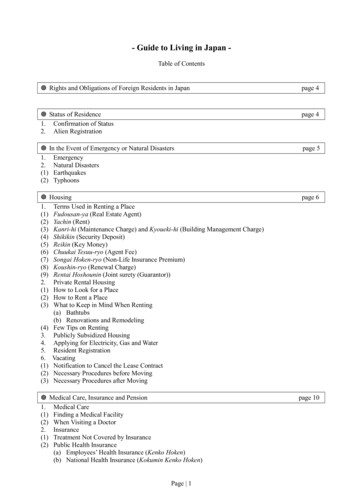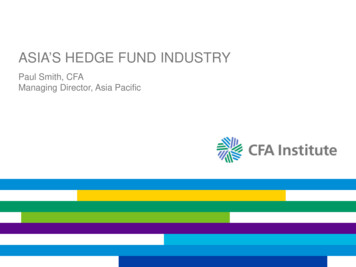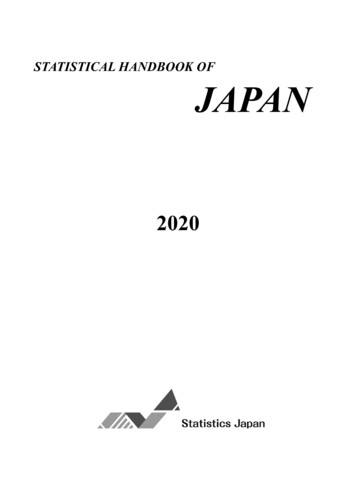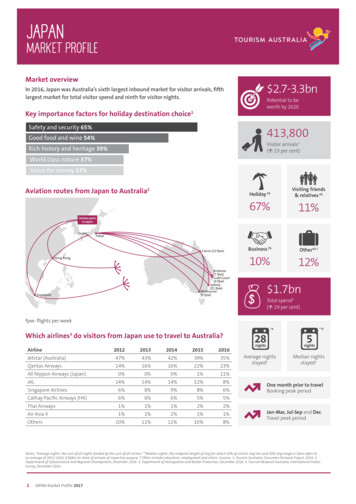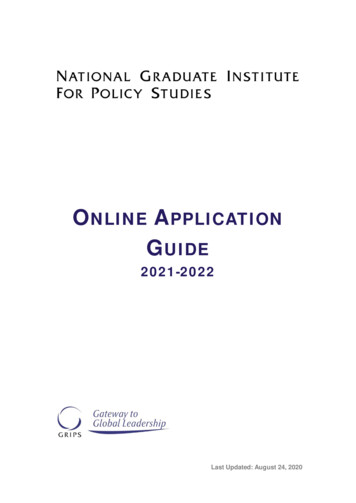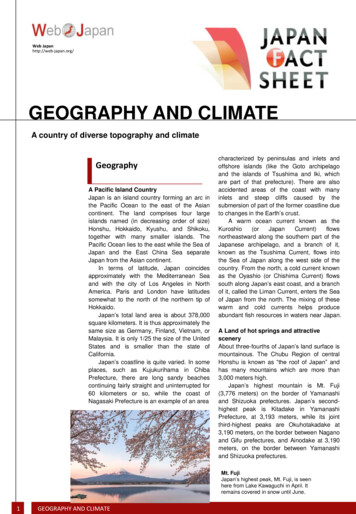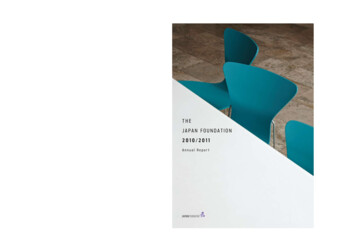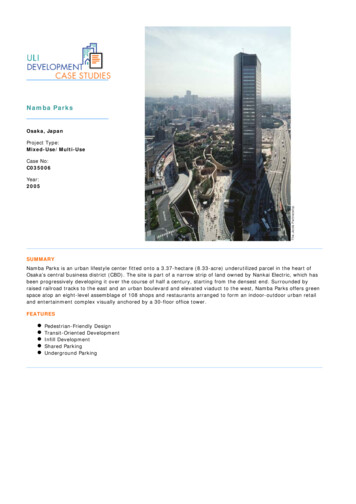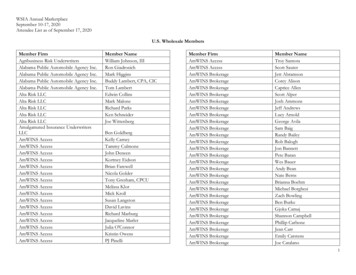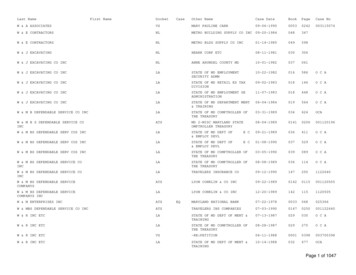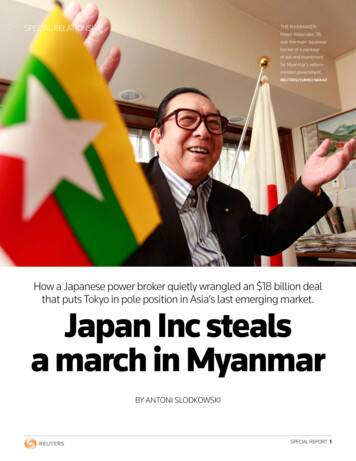
Transcription
SPECIAL RELATIONSHIPTHE RAINMAKER:Hideo Watanabe, 78,was the main Japanesebacker of a packageof aid and investmentfor Myanmar’s reformminded government.REUTERS/Yuriko NakaoHow a Japanese power broker quietly wrangled an 18 billion dealthat puts Tokyo in pole position in Asia’s last emerging market.Japan Inc stealsa march in MyanmarBy Antoni SlodkowskiSPECIAL REPORT 1
SPECIAL RELATIONSHIP JAPAN INC STEALS A MARCH IN MYANMARYANGON/TOKYO, october 3, 2012Japan Inc is charging into Myanmar.The rush began one night last October,when Myanmar’s new president rolledout a map after dinner to show an agingJapanese power broker a prize that could beTokyo’s to develop - a swathe of land nearlyas big as Macau.Thein Sein, 67, a former general, had beenpresident of Myanmar’s civilian governmentfor just six months. He had won cautiouspraise for reconciling with democracy iconAung San Suu Kyi and opening Myanmar’seconomy after five decades of brutal juntarule. Now he was seeking investors to develop Asia’s second-poorest country.After a Chinese-style banquet at thepresidential residence in the capital ofNaypyitaw, Thein Sein turned to HideoWatanabe, 78, a Japanese politician withan enduring interest in Myanmar. The newpresident offered a deal: Japan could develop a special economic zone at Thilawa, aspot near both Myanmar’s largest city anda port on the Indian Ocean - if it came upwith the money.“I told him I would figure somethingout,” recalled Watanabe, a former cabinetminister and top aide to ex-Japanese PrimeMinister Yasuhiro Nakasone.Watanabe was as good as his word. A fasttrack deal negotiated in less than a year haspaved the way for Japan to provide at least 18billion in aid, investment and debt forgivenessfrom government and private sources.In addition to this deal, Reuters haslearned that Japan will provide up to 3.2billion in new lending to build another special economic zone and deep-sea port inDawei, in southern Myanmar, which wouldbe developed into Southeast Asia’s largestindustrial complex.The deals have made Japan a major playerovernight in the opening of Myanmar. Thepart of the Thilawa package that includesdebt forgiveness and refinancing adds up tonearly 5 billion, dwarfing the 76 million inBankrolling MyanmarCountries investing 100 million or more in Myanmar as of June 30, 2012ChinaNEPAL 14.1 billionThailandINDIAHong KongCHINABANGLADESHSouth KoreaU.K.M YA N M A RSingaporeNaypyitawYangonMalaysiaFranceTHAILANDThe Thilawa dealwould bring 18 billionin funding anddebt forgivenessU.S.A.IndonesiaNetherlandsSite of Thilawaspecial economiczone200 km200 milesJapanIndiaPhilippines0369121518Note: U.K. figures include British Virgin Islands, Bermuda Islands and Cayman Islands.Source: Myanmar Central Statistical Organization.aid from the United States in 2011 and 2012and a two-year package of 200 million theEuropean Union has pledged.In reconstructing how Japanese government and business leaders moved fromcautious re-engagement with Myanmar toa gold-rush embrace over the past year, Reuters spoke to more than 50 officials, executives and politicians involved in the efforton both sides. They described how a smallgroup of well-connected Japanese pushedTokyo’s bureaucracy and aid agencies tofast-track key decisions, even while Myanmar’s laws on investments were still beingdebated in its nascent parliament.At stake is influence in Asia’s last frontier market. The Japanese pounced asMyanmar’s leaders were looking for alliesto blunt China’s enormous influence inMyanmar. Japan’s push back into Myanmarhas vaulted it ahead of the United Statesand the European Union, which have beenmore cautious in unwinding trade and investment restrictions put in place in the1990s. One likely result is a big leg up forJapanese trading houses, banks, contractorsand engineering firms.“We are lucky because the U.S. was kindenough to introduce economic sanctions that’s why Western financial firms have sofar no presence in Myanmar,” said ShigetoInami, who manages Myanmar operationsfor Daiwa Institute of Research. The thinktank runs Myanmar’s tiny stock exchangeand has plans to transform it into a thrivingbourse by 2015.U.S. and European diplomats said theydon’t necessarily see the Japanese win asdisadvantageous to Western multinationals. Washington has been urging allies,including Tokyo, to enter Myanmar tobuttress the economy and thereby the reSPECIAL REPORT 2
SPECIAL RELATIONSHIP JAPAN INC STEALS A MARCH IN MYANMARformist wing of the military-backed government, a senior State Department officialtold Reuters.A handful of U.S. giants – including GEand Coca-Cola - already have returned. InThilawa, Western power firms such as GEand Siemens and construction giants suchas Bechtel and Balfour Beatty could winsubcontracts from the Japanese, businessanalysts say.“Many of our competitors have been inthat market for many years, so we’re alreadylate to the game,” said John Goyer, seniordirector of Southeast Asia for the U.S.Chamber of Commerce. But “there’s clearinterest and desire on Myanmar’s part tohave U.S. companies there.”THE MYANMAR LOBBYJapan’s rush carries risks. The deals call forJapanese companies to do business with a tycoon blacklisted by the United States, exposing them to potential reputational damage.And Japan has pledged to develop the2,400-hectare (5,930-acre) special economic zone in Thilawa before ownershipquestions surrounding the land have beenresolved. So far, Thilawa is most notablefor its emptiness. Rice paddies fill land earmarked for factories. Workers collect clayin baskets as trucks haul gravel to drop intothe soggy ground.“Welcome to our new El Dorado,” saidMyint U, a former government official whonow connects foreign investors to Burmeseministries, as he drove a visitor through theemerald plain.Japanese executives believe the risks arebig and the upside even bigger. “If I startedwriting down a list of problems, I could writea checklist with 50 or 60 lines,” said YasuhiroMorimoto, manager of strategy in Asia andOceania at project investor Marubeni Corp.Still, he added, the potential benefits outweigh the perils for the trading house.Myanmar has long been seen as a prize.A land mass as large as Britain and Francecombined, it shares borders with 40 percentREASSURANCE: Japan’s Foreign Minister Koichiro Gemba met Aung San Suu Kyi during a visit to Myanmarlast December. His trip helped bolster confidence in the Thilawa project. REUTERS/Soe Zeya TunWe are lucky becausethe U.S. were kind enough tointroduce economic sanctions– that’s why Western financialfirms have so far no presence inMyanmar.Shigeto InamiManager of Myanmar operations forDaiwa Institute of Researchof the world’s population in India, China,Bangladesh and Thailand. Its ports on theIndian Ocean and Andaman Sea sit justnorth of the Malacca Strait, one of theworld’s busiest shipping lanes.China remains Myanmar’s biggest patron. Led by investments in energy, Chinaand its companies pledged more than 14billion for Myanmar in the fiscal year ended March 2011, nearly 70 percent of totalforeign investment. Japanese companiesinvested just 212 million in Myanmar between 1988 and 2011.Yet Tokyo has an ace up its sleeve: Japan’sties with Myanmar have been unusuallywarm, despite the brutal Japanese occupation of the country during World War Two.Myanmar was the first Southeast Asiancountry to settle reparation claims againstJapan after the war. Independence leaderAung San (Suu Kyi’s father) and formerdictator Ne Win were members of the“Thirty Comrades” movement against British rule, which was educated and trained byJapanese army officers. Myanmar has eschewed the sort of sharp attacks on Tokyoover the past that are routine in China andthe Koreas, endearing it to many conservative Japanese politicians.Unlike the West, Japan never imposedtrade and financial sanctions againstMyanmar. As a result, Japan Inc alreadyhas a significant presence in the country. Major banks such as Mitsubishi UFJ,Sumitomo Mitsui Financial and MizuhoFinancial Group have branches in the commercial hub of Yangon. The time has cometo “monetize” strong Japan-Myanmar relations, a top bank executive told Reuters.Watanabe’s emergence as Tokyo’s man onMyanmar represents a second act in a careermarked by an ability to cultivate influentialfriends across the political spectrum.Watanabe was 11 when World War Twoended. His older brother was one of the lastSPECIAL REPORT 3
SPECIAL RELATIONSHIP JAPAN INC STEALS A MARCH IN MYANMAR“kamikaze” pilots to die in the battle forOkinawa, a memory he sometimes sharesin public speeches.He embarked on a long career as a conservative politician and in the 1990s washead of Japan’s Posts and Telecommunications Ministry. His first involvement withMyanmar came in 1987, when he hostedjunta generals in Tokyo as deputy chiefcabinet secretary to Nakasone. Even after the generals cracked down on studentprotesters and put Aung San Suu Kyi under house arrest two years later, Nakasoneurged Watanabe to develop and deepen Japan’s unofficial ties to Myanmar.Watanabe’s support for the junta neverwavered, though the crackdown had madethe regime a pariah. “Myanmar had nochoice but to introduce a military regimeto preserve internal law and order,” hewrote this year on the website of the JapanMyanmar Association, a group he launchedto rally support for the wave of investment.He met Thein Sein in 1996 during a tripto carry medical equipment to Myanmar inShan State, where the Burmese general wasregional military commander. Afterward, thegeneral invited him to play a round of golf.“That was the only fun we had,” Watanabe recalled in an interview with Reuters.“He was pretty good at golf. And back inthe day, with the army uniform on, he wasawe-inspiring.”It’s not the usual description of TheinSein, who was born to humble rice farmersand held mostly bureaucratic jobs in a fourdecade military career that culminated in his2007 appointment as interim prime minister. The bookish-looking general became thefirst civilian president in 49 years, after overseeing a new constitution in 2010 that guarantees the military a place in government.Watanabe’s personal diplomacy hassometimes left Japan’s foreign ministryscrambling to keep up.Last Oct. 21, Japanese Foreign MinisterKoichiro Gemba hosted a dinner in Tokyo for Myanmar’s foreign minister. It wasthe first meeting between the two nations’top diplomats in 16 years. Gemba pledgednew investment from Japan - provided thatMyanmar show “substantial progress” indemocratic reforms.That same night, Watanabe was poringover a map in Myanmar’s capital with President Thein Sein. But the senior Japanesepower broker sent a very different signalabout the pace of rapprochement.The new president told Watanabe an attempt to build the Dawei economic zonewith Thailand was floundering. Thein Seinhad also just stopped a Chinese-funded hydroelectric project, after protests by peoplein the area whose livelihoods it threatened.That opened the door for Japan.“Thein Sein said, ‘Watanabe-san, I havesomething for you.’ He sent his secretary outto come back with the documents. And that’show we came to Thilawa,” said Watanabe.The Myanmar embassy in Tokyo andthe president’s office in Naypyitaw did notrespond to requests for Thein Sein’s accountof the meeting with Watanabe.When he returned to Tokyo after theOctober 2011 meeting, Watanabe said, hegot in touch with Foreign Minister Gemba.“I told Gemba: ‘You have to go to Myanmar on an official visit before year-end totell them we are looking into the Thilawadeal closely.’ If he didn’t do that, it wouldn’thave become an official government initiative, right?” said Watanabe.To pressure Gemba to act, Watanabesays he persuaded Japan’s trade minister,Yukio Edano, together with Yoshito Sengoku, an influential politician in the rulingDemocratic Party of Japan, to go to Myanmar as soon as possible.“Then I went back to the foreign ministry and told them about Edano’s promiseto visit Myanmar,” Watanabe said. “If thetrade minister went to Myanmar before theforeign minister, Gemba would lose face.That’s why he went there in December.”The Japanese foreign ministry and theMinistry of Economy, Trade and IndustryTokyo bets on BurmaThe centrepiece of Japan’s investment inMyanmar is a 2,400-hectare (5,900-acre)special economic zone in Thilawa, strategicallylocated on the edge of the commercial capital,Yangon, and the Indian Ocean coast.Japan would provide an estimated 12.6 billionin aid to build infrastructure around Thilawa, threeofficials with direct knowledge told Reuters.Mitsubishi Corp, Marubeni Corp andSumitomo Corp. will form the Japaneseside of the joint venture in Thilawa with a49 percent share. They would work with aconsortium of Myanmar businessmen whoare expected to include longtime cronies ofthe military-backed government.The plan is to build the first 450 hectares (1,111acres) of the industrial park by 2015 and startluring Japanese and global manufacturers.Myanmar’s parliament is working on a newforeign investment law, and is revising legislationgoverning economic zones.A key part of the plan would addressMyanmar’s dire shortage of electricity. Onlya quarter of the population has access topower. Around 900 million is planned for a500-megawatt power plant that would supplyelectricity to Thilawa and Yangon, the crumblingcity of six million a half-hour’s drive from theindustrial park, Marubeni says.Japan is also investing in an economic zonein Dawei on the southern peninsula, where thelargest industrial complex in Southeast Asia ison the drawing board.Reporting by Antoni Slodkowski;editing by Bill TarrantSPECIAL REPORT 4
SPECIAL RELATIONSHIP JAPAN INC STEALS A MARCH IN MYANMARBRIDGE TO FUTURE: Japan’s 18 billioninvestment in Thilawa will transforma rural area outside the commercialcapital of Yangon into a huge industrialzone. REUTERS/ Soe Zeya Tundeclined to comment on Watanabe’s account of the meetings.In March, Watanabe launched theJapan-Myanmar Association. Foundingmembers included Nakasone and formerPrime Minister Taro Aso, known for hisforceful line toward China. The associationalso includes retired government bureaucrats and executives from trading housesMarubeni and Mitsubishi Corp. It provided the impetus for a government studygroup to coordinate an aid package thatwould take shape over the summer.Watanabe also went to work lobbyingfor debt forgiveness, using connections inthe Ministry of Finance. On April 21, sixmonths after his dinner in Naypyitaw, thefinance ministry announced a deal to waivemore than 60 percent of Myanmar’s debt toJapan. Watanabe said he had pushed for afull waiver but was told that was impossiblebecause of resistance from the Paris Club ofcreditor nations.People involved in arranging the package say Tokyo has agreed to waive 3.7 billion of debt and is putting together a 900million bridge loan to cover Myanmar’sarrears to the World Bank and the AsiaDevelopment Bank, through a consortiumof Japanese banks led by Bank of TokyoMitsubishi UFJ. 5billionThe amount of money Japan hascommitted in debt forgivenessand refinancing.Officials at the International MonetaryFund “were very surprised at the speed of Japan’s waiver,” said a Japanese government official directly involved in the talks. “They saidthey’ve never seen anything like that before.”Japan has since struggled to persuadeother donors that its approach on a debtwaiver is the best way to encourage reformsin Myanmar, and has invited other partiesto discuss the issue next week in Tokyo, theofficial said.In March, Tokyo politicians also got afirst-hand look at one of Japan Inc’s newbusiness partners in Myanmar: Win Aung, abusinessman blacklisted by the United States.The Burmese tycoon visited Japan to speakat the opening of Watanabe’s Japan-Myanmar Association, where he rubbed shoulderswith Edano, Sengoku and Nakasone.“Industrialization is essential for the deSPECIAL REPORT 5
SPECIAL RELATIONSHIP JAPAN INC STEALS A MARCH IN MYANMARNEW FRONTIER: The Thilawu special economic zone nowis mainly occupied by fishermen and farmers. But soonJapanese industry will be moving in. REUTERS/Soe Zeya TunSPECIAL REPORT 6
SPECIAL RELATIONSHIP JAPAN INC STEALS A MARCH IN MYANMARvelopment of Myanmar,” Win Aung saidin his speech. “That’s why I’m extremelyhappy that Minister Edano has shown hissupport” for Thilawa.Win Aung runs construction firmDagon International Ltd and heads Myanmar’s chamber of commerce. His firm wasone of eight that won contracts to buildthe new capital of Naypyitaw. He allegedlyexported timber to China from protectedareas after winning contracts because of hismilitary ties, according to confidential U.S.diplomatic cables published by Wikileaks.Win Aung did not respond to an emailseeking comment. He remains on the U.S.Treasury’s “blocked persons” list, meaningAmericans are prohibited from doing business with him.It is Win Aung who will determine whoforms the Myanmar side of the consortiumto develop Thilawa.According to one person involved in thetalks, the roster is expected to include ZawZaw, an industrialist with close ties to theregime whose businesses range from timber to rubber plantations and construction.He, too, is on the U.S. Treasury blacklist.Zaw Zaw built his fortune exporting usedcars from Japan to Myanmar, and his MaxMyanmar-brand trucks and banners are already visible in Thilawa.Among those who aided Watanabe inthe Myanmar opening is Yohei Sasakawa,who runs the Nippon Foundation, a majorphilanthropic organization. The foundationwas founded by Sasakawa’s wealthy father,a powerful figure in postwar Japan whochampioned far-right political causes.Sasakawa, who also has a longtime interest in Myanmar, joined Watanabe andSengoku during another round of negotiations on Thilawa with Thein Sein in July inNaypyitaw. There, Sasakawa offered to conduct charitable activities in ethnic-minorityareas that had long been in conflict with thejunta. He said it is essential the minoritiesJAPANOPHILE: Zaw Zaw, a businessman with close ties to the former junta, got his start importingused Japanese cars. He is expected to be one of Japan’s partners in the Thilawa project.REUTERS/Soe Zeya Tununderstand that the new administrationhas peaceful intentions. Myanmar’s conflictzones did not take part in the 2010 elections.The broad agreement between the twocountries was signed in August. The Myanmar side is now working on the details of theindustrial consortium to be led by Win Aung,while Japan is drafting infrastructure plans.Suu Kyi’s National League for Democracy said it isn’t concerned about whetherthe proposed investment would pay political dividends for the military-backed government. Suu Kyi has thrown her supportbehind a bill on foreign investment nowbefore parliament and is calling on theWest to further ease sanctions.“We are not worried about it at all,” saidHan Tha Myint, a member of the party’scentral executive committee. “What mattersmost for us is whether these investments andaids are beneficial for the people or not.”The Japanese trade ministry wouldn’tcomment on the reputational risk Japanesecompanies may face in partnering with former junta cronies in the Thilawa project.“The Thilawa development project start-ed from a request from the government ofMyanmar, and the two governments areconsidering it,” ministry spokeswomanAsagi Sakai said. “No concrete decisionshave been reached on the shape of JapanMyanmar cooperation in Thilawa.”Back in his Tokyo office, Watanabeshrugged when asked about the risks of being an early investor in Myanmar. “If thereare any companies that are worried aboutsuch things, they might as well stay in Japan,” he said. “It’s their choice.”Additional reporting by Jason Szep and Aung HlaTun in Yangon, Sebastian Moffet in Brussels, AndrewQuinn in Washington, Martin Petty in BangkokEditing by Bill Tarrant and Michael WilliamsFOR MORE INFORMATIONAntoni Slodkowskiantoni.slodkowski@thomsonreuters.comBill Tarrant, Enterprise Editorwilliam.tarrant@thomsonreuters.comMichael Williams, Global Enterprise Editormichael.j.williams@thomsonreuters.com Thomson Reuters 2012. All rights reserved. 47001073 0310. Republication or redistribution of Thomson Reuters content, including by framing or similar means, is prohibited without the prior written consent ofThomson Reuters. ‘Thomson Reuters’ and the Thomson Reuters logo are registered trademarks and trademarks of Thomson reuters and its affiliated companies.SPECIAL REPORT 7
THE RAInMAkER: Hideo watanabe, 78, was the main Japanese backer of a package of aid and investment for Myanmar's reform-minded government. REUTERS/YURiko Nakao. SPECIAL REPORT 2 SPECIAL RELATIOnSHIP JAPAn InC STEALS A MARCH In MyAnMAR yAnGOn/TOkyO, OCTOBER 3, 2012 J

